#shamhat draws
Text
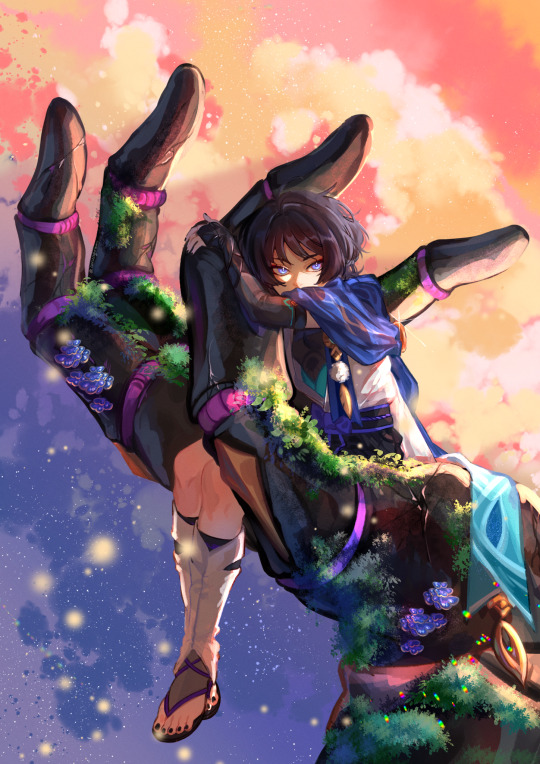
Yaoyorozu
14K notes
·
View notes
Text
I've been without wifi for the last three days so sorry for not posting lately ,, I could only work on my drawings and without references so here's some stuff I made
Kylar inspired by 'Le mal sorcier by Amatsuki-san' and Shamhat WIP


also

#digital art#fanart#digital artist#drawing#dol#dol kylar#kylar the loner#degrees of lewdity#storytaco#dirty crown scandal#shamhat#magician#buy me a kofi#artist on ko fi#ko fi support
29 notes
·
View notes
Note
Plot twist: the moment d!reader is set free from both of the circles at the end of the journey, they dissapear into the night, never to be seen again...or not.
I'm sorry i just, as much as i love yanderes, i want to see them suffer. At least a bit.
Ps. You're an amazing writer and i really enjoy your fics. Also, you really helped in getting my friend into yandere, so thank you for that🙂
Taken Aboard:
Running Away
(I’m super glad that you enjoy my fics! And I’m glad your friends enjoys them, too! Yandere is a really fun trope to play with!)

So, in the case that you do pull a runner at the end of this long and arduous journey, Y/N… your biggest enemy is now yourself.
Because, as hard as you might have tried to fight it, you have been civilized. You have grown accustomed to society. You have started to care. This journey has changed and bettered you, as it has all your companions.
You are no longer a mere demon tending to monsters great and mighty, no more a child planting seeds and spreading spores.
You can’t ever go back to being the wild little creature you once were.
If you’ve ever read Gilgamesh, I’d say Enkidu is a good comparison for your development. After he’s been ���civilized’ by Shamhat, Enkidu can no longer return to the home he knows and loves, the animals who once accepted him now fleeing on sight.
Now, if you leave before the journey’s end…
You run, devastated and distraught that so much of yourself is gone and lost, never to be reclaimed. The forest may not be the home you know, but some part of it is still familiar.
You purge the hunters and loggers who have taken up residence within the Emerald Grove, violently spilling their nourishing blood across the hungry soil, pitch their flesh into the mouths of ravenous beasts.
It doesn’t make you feel better- you know that at least some of these men and women were trying to feed themselves, their children.
But at least the forest is newly quiet, contented by a fresh meal, leaving you in peace to mourn.
As for hoping to ‘never being seen again’…
Sun Wukong’s Golden Vision has a little something to say about that.
Within hours he’s stalking back to the Emerald Grove in a huff, hauling his way up the tallest tree he can find and unhappily making his way over to you.
The Great Sage snatches you off the bark and tosses you over his shoulder, clambering down the tree as you kick and scream. You demand to be released and removed from the group, biting and pounding your fists agains his invulnerable back.
“Being naughty today, bud? Here I was, thinking you had finally gotten past this ‘running back home’ phase.”
“I am not a baby,” you scream, digging your teeth into the base of his spine with all your demonic might. “PUT ME DOWN!”
You manage to draw just a few drops of blood, not that it phases the simian. He doesn’t even seem to notice.
“You’re making things harder for all of us, you know that? And you keep setting us back with all the running away nonsense. But I had Master call a certain someone up to maybe settle this for us all, bud.”
Against your angry protests and endless assault does the Great Sage drag you back to camp, switching to hold you in his arms instead of over his back.
Immediately do your screams of anger turn to pained wails, the sound of a holy sutra hitting your eyes. The blessed bands around your wrists tighten, scraping the skin they compress to rawness.
And before you stands not only the holy monk who tricked you into wearing these golden hoops, but the goddess who gave them to him.
“Sun Wukong, please place the child down,” she lightly instructs, her tone even and polite. “Might I speak to them for a moment?”
The Handsome Monkey King obeys, nudging your towards the goddess after he releases his grip on you.
Guanyin comes to you slowly, kneeling to take your face into her soft and gentle hands.
And you bite her.
“You- you call yourself a goddess,” you scream, fangs wet with her divine ichor. “Of mercy and compassion! But all you do is hand out tools of torture and punishment! I wanted to stay in my forest! I wanted to stay with my friends! A hard shove, nearly knocking her over. “And you helped Sanzang take me away! You gave him these awful bands and he pretended they were gifts to get me to put them on! But they weren’t! And you let him! And now he uses them to hurt me! I hate you! I hate him! I hate all of you!”
Finally you collapse, sobbing openly into your hands.
Tang Sanzang watches in horror as heavenly blood feeds the ground, causing new and gorgeous growth to break from the soil, flowers blooming in massive clusters.
Wukong seethes that you could be so disrespectful to the one and only god he actually cares for, the only one he finds to be tolerable and kind.
Everyone else just recoils in both fear and hurt, your last words ringing painfully in the ears.
But Guanyin approaches once more, kneeling to level herself with you. There is no retribution or anger in her touch, placing a light kiss onto your forehead.
“You’re right, aren’t you? This journey has not been easy, nor has it been kind- and for you especially, perhaps it has been cruel. And I too, have been unkind to dabble in your affairs. Will you allow me to ease the burdens of your travel?”
From a silk pouch does she procure a mirror, pushing it into your shaking hands.
“My child, I give to you this heavenly mirror, which has been forged from blessed steel and holy sand melted to glass by dragonfire. To look upon it will show you your beloved forest, and all those you have left behind.”
———————————————————————-
Now, this is super important- Y/N’s involvement in the journey is incredibly unfair. The others come because they seek personal growth or redemption, but Y/N?
They had to come. They were tricked into thinking those golden tightening bands were gifts and eagerly asked Sanzang to help put them on, jumping up and down in excitement at receiving something so pretty. The only reason they agreed to wear these ‘generously’ gifted bands was because they thought it was an honest gift.
So there’s already a sense of betrayal about the whole thing, that their first gift from anyone was actually just a trap to pull them along on a lengthy and dangerous journey.
Then, where the others were either entirely willing (Sanzang) or had to redeem themselves for crimes or mistakes (Wukong), Y/N was forced to come along with their worst crimes being: fighting off invaders and killing poachers. And all for that, they are ripped from home and forced to leave behind everything they’ve ever known and loved.
And Guanyin does three things here:
1. Acknowledges your anger/sorrow.
2. Validates your feelings without hesitation.
3. Actively works to soothe them.
With the mirror in hand, you can look upon the Emerald Grove and see your old animal friends, know that they’re safe even without you, and put your fears to rest.
It’s not perfect.
But it’s a good start to get you to actually care about these pilgrims, given that you don’t spend every night in flurry of nightmares, thinking fitfully of your beloved forest.
#Platonic Yandere#Yandere Lego Monkie Kid#Yandere LMK#Yandere Tang Sanzang#Yandere Sun Wukong#Guanyin#Taken Aboard#Journeyfam
73 notes
·
View notes
Note
So I reread Shamhat on a whim and came up with some more questions:
So wouldn't Goji and San's coming brawl (or at least them beefing with each other) violate the sorta unspoken rule about being civil to each other on Infant Island? I ask because Vivienne previously stopped a potential problem between Goji and Rodan in an earlier chapter and just generally feel like Mothra wouldn't be very happy about either of them banging each other up.
So I'm assuming Mothra lets out the pheromones because she's a moth, and that's a thing that Moths do and not just a kaiju thing. Or... is it? Like if Tiamat went into heat would she also start shooting out pheromones? Or does each female kaiju have like a unique heat thing that works to attracts mates?
We've been told that the rut/heat relationship works on a Female - Male basis. Female goes into season, triggers male rut, the fuck happens. Is this constant across all sexual orientations? Like, if there was an exclusively gay male kaiju somewhere would a female's heat just have no effect on them? Would they need another male to trigger their rut?
Was the weird thing with Vivienne in the chapter where she bit Tiamat because of the baby developing and instincts bleeding over, or something else? (if the answer to this is a spoiler than by all means be vague about it)
Has Rodan and/or Vivi thought of a name for the kid yet? (refer to the previous question if you don't want to answer this yet)
Final spicy one: What's the projected spike in the Demi-Titan (Titan/Human Hybrid) population looking like when word that the Titans are biologically compatible gets out? Or just the spike in Titan/Human relations?
Whoo!
Mothra certainly won't be pleased that the boys are fighting on her island and plans to make them both sleep on separate couches once all is said and done (she doesn't care "who started it," only that it started at all, and also San knew what he was getting into when he agreed to come and that Goji was playing with fire for seducing his rival's mate). Her ire will be a bit lessened considering what the beef will quickly turn into, though...
I wanna say the sex pheromones specifically are a Mothra-species staple, while others have different ways of drawing in potential mates. In Tiamat's case, it's her bioluminescence and frills fanning out, like a male peacock. Some species will announce their "current state" through body language or straight-up screaming to get a male's attention ("FOR FUCK'S SAKE I NEED A DICK IN ME RIGHT THE FUCK NOW MY ESTRUS IS FUCKING KILLING ME!!").
I want to be careful about this for obvious reasons, but I want to say that a female's heat signals wouldn't necessarily work on a gay male Titan. Maybe the male is aware that a female is in heat, it just doesn't do anything for him because he's naturally not attracted to the opposite sex. It would work on a bisexual Titan, but I digress. Maybe thanks to how intelligent many Titans are, there's a social agreement among the various species that the "breeding zones" are to be separate from zones where gay Titans can go looking for a mate; in which case, a Titan would react to the "call" of a potential mate of the same sex. Sort of like the gay bars of the wild.
If memory serves correctly, it might be a mix between the baby developing, Rodan's instincts bleeding into Vivienne's more dormant "ancient human" instincts, and her being in close proximity to multiple males in rut, which caused her angry bitey cavewoman reaction. She wasn't just defending her mate, Vivienne in the moment was perceiving Tiamat as a potential threat to her expecting family. (It also makes sense to me that a mama bird would flip out if she spotted a snake anywhere near her nest.)
They haven't had an opportunity to brainstorm baby names yet, on account of the whole rut happening at the moment, but once things calm down and Vivienne begins showing, they'll have plenty of slow days where they can relax and test what names work... or rather, Vivienne will test names. Titans don't always refer to each other with specific names, so Rodan is getting used to that.
I wanna say that there won't be an immediate spike in Demi-Titan births; the chaos of 2014 and especially the Mass Awakening is still fresh in many people's memories, but the revelation that Titans can communicate on a human scale will make it easier for many humans to come to terms with all the Everything that's happened and continues to happen. Platonic Human/Titan relations will gradually improve over time... and once some brave souls get over the initial hurdle of "am I attracted to a big monster" and accept their newfound sexual awakening, intimate or even romantic Human/Titan relations will slowly follow.
Bonus, because The Elder Scrolls just turned 30 years old, a bit of Shamhat baby lore based on how "mixed" baby-making works in TES lore: Demi-Titans take after their mothers; in the case of Titan father/human mother, they naturally need to be human-sized babies in order for mom to give birth without, y'know, dying. In the case of of Titan mother/human father parents, the same applies but on a larger scale.
8 notes
·
View notes
Text
Rimat Ninsun
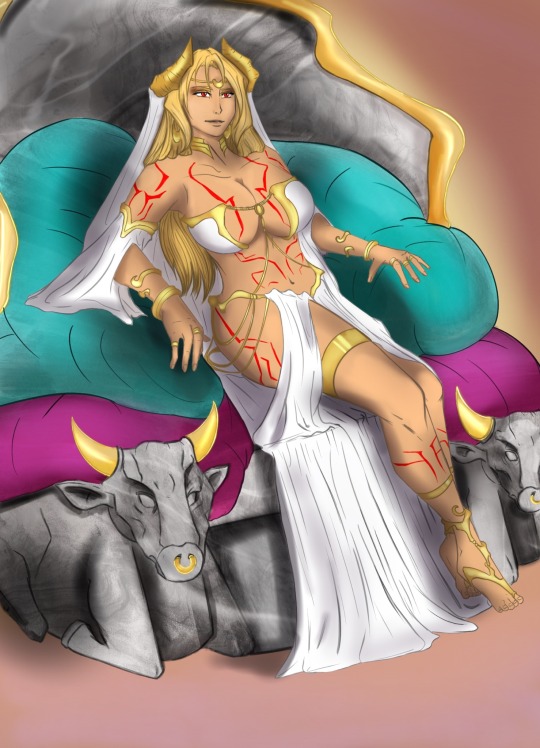

Well it took me a while but here it is
Goddess of the Wild Cow Mother of Gilgamesh
Probably neither the cow statues or marble like throne are historically accurate but i wasn’t aiming for that
After drawing Lugh i was like ok maybe I should do another god and sooooo
The idea to draw her like this was an inspiration of @xxxdreamingflowerxxx with her story Beyond Time and Space LINK
i had a funny idea to escort this picture with Cu Chulainn and Gilgamesh arguing (or their lily versions Setanta and Ko Gil ….
Cu : Well…. YOUR MOM IS A COW
Gil : …She actually is …..
(But I never did it )
To be fair I believe @not-shamhat and @christinethethunnus have done a much better job than i did in their designs
A special shout out to @sincerelymissatomicbomb who i annoyed while i was making it lol
#Gilgamesh#rimat ninsun#fate grand order#fgo#the epic of gilgamesh#fate go#fate strange fake#caster gilgamesh#my art#ninsun#archer gilgamesh#fgo gilgamesh#ko gil#fate series#kid gil
34 notes
·
View notes
Text
Then Shamhat saw him–a primitive,
a savage fellow from the depths of the wilderness!
“That is he, Shamhat! Release your clenched arms,
expose your sex so he can take in your voluptuousness.
Do not be restrained–take his energy!
When he sees you he will draw near to you.
Spread out your robe so he can lie upon you,
and perform for this primitive the task of womankind!
His animals, who grew up in his wilderness, will become alien to him,
and his lust will groan over you.”
Shamhat unclutched her bosom, exposed her sex, and he took in her voluptuousness.
She was not restrained, but took his energy.
She spread out her robe and he lay upon her,
she performed for the primitive the task of womankind.
His lust groaned over her;
for six days and seven nights Enkidu stayed aroused,
and had intercourse with the harlot
until he was sated with her charms.
But when he turned his attention to his animals,
the gazelles saw Enkidu and darted off,
the wild animals distanced themselves from his body.
Enkidu … his utterly depleted body,
his knees that wanted to go off with his animals went rigid;
Enkidu was diminished, his running was not as before.
The Epic Of Gilgamesh
10 notes
·
View notes
Text
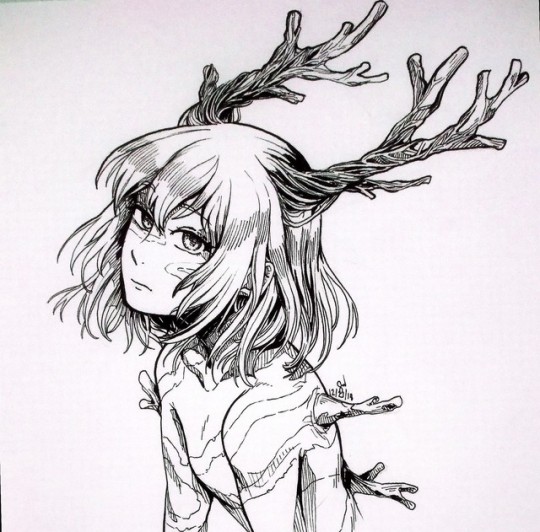
Local divine ditto turned shamhat look-a-like.
#enkidu#fate#fgo#fsf#shamhat mention#i did a thing#i would accomplish a whole lot of things if i am charged with the same motivation and energy to draw enkidu related shit#but sadly nope#my art
22 notes
·
View notes
Text
Mythology Drabbles #4
Since I know you like these @green-spear-of-causality.
Tried to include a little more dialogue than usual, lets see how they turned out.
Disclaimer: Some of these drabbles are not presented entirely accurately to the source material they are drawn from. They are not meant to be entirely accurate. That being said, I hope you enjoy, and constructive criticism is always welcomed and encouraged.
...
A Fated Death
The spears had come quickly, raining one after another from the nearby cliff. The first struck Laeg, and the charioteer fell with nigh a scream. The second struck Liath Macha, and the horse crumpled instantly, sending the chariot spinning. Cu Chulainn, the Hound of Ulster, was flung from the chariot, and before he could spring to his feet, the third spear stabbed through his torso.
The shock was immedient, and so was the realization that he had been ambushed. Cu forced himself to his feet, even through the pain shooting through his body. A smirk graced his face and he tore the spear from his torso.
“Well!? Warriors who have ambushed me! Show yourselves! You think I will go quietly!? No. I’ll take you all on!”
Cu turned and saw the hill above him lined with warriors. Lugaid mac Con Roi led them, drawing a sword.
“You can barely stand, Hound of Ulster. Admit you’ve been beaten.”
Cu smirked wildly, “That’s your problem!? Here, I’ll fix that for you!”
Cu dragged himself to a nearby standing stone, and fell to one knee as he reached it, coughing wildly. Lugaid and his forces approached slowly. The Hound of Ulster stood, strapping himself to the rock with his belt.
“Well Lugaid?” Cu asked, blood dripping down his face, “Good enough for you now!?”
Lugaid narrowed his eyes, “You’re too arrogant for a mere dog.”
“I’m too arrogant for a dog? Well, come on, let’s see if I’ve earned my arrogance!”
Lugaid roared and stabbed forward with his own sword. Cu deflected it with the spear he ripped from his own body, before tossing it aside, and drawing his sword.
Lugaid’s forces charged forward and Cu parried every blow. Men fell, and eventually they all fell back. Blood flowed from Cu Chulainn’s body, and the light in his eyes was dimming by the second.
That damned smile still graced his features.
A raven circled overhead, slowly flew towards him.
Cu murmured quietly, “I didn’t...I didn’t say goodbye to Emer, did I?”
The raven landed on Cu’s shoulder, and Cu closed his eyes, face set to a sad smile.
It’s always something with me, ain’t it.
/////////////////////////////////////////////////////////////////////////////////////////////////////////////////////////////////////////////////////////
Gods’ Punishment
Enkidu was dying. That much was obvious. His skin had grayed, his hair had whitened, his eyes had paled out, their vibrant red to a sickly pink. It was like the very life was being sucked from Enkidu.
This was no illness. This was punishment.
Gilgamesh kneeled by his friend’s bed, torn between crying and destructive anger. The floor around Gilgamesh and the walls of the room were dotted with craters. Shamhat stood in the corner, having also come to be with Enkidu in his final days.
Gilgamesh stared at the ground quietly. Shamhat shuffled towards him, and placed her hand on his shoulder. Gilgamesh shrugged her off, and Shamhat understood, backing off.
Enkidu could barely speak, so he rasped out, “Gilgamesh. My friend. I can feel my senses fading. I feel this is my last day on this Earth.”
Gilgamesh's voice cracked, “Talking so poetically doesn’t suit you, Enkidu.”
“Shut up.” Enkidu gasped.
“That’s better,” Gilgamesh smiled sadly.
Enkidu’s body was racked with coughs, blood dripping out from his mouth.
“Do you need anything?” Gilgamesh whispered, propping Enkidu up on his cushions.
Enkidu could barely work a smile, “Just...you...and Shamhat...please stay with me...as I go…”
Shamhat made her way over, and Gilgamesh made space for her to kneel next to him.
The next few moments were peaceful. Just the rise and fall of Enkidu’s chest.
Rise. Fall. Rise. Fall. Rise. Fall. Rise…
Gilgamesh was the first one to start crying.
/////////////////////////////////////////////////////////////////////////////////////////////////////////////////////////////////////////////////////////
At the End of It All, Could You Promise Me, as a friend, One More Time?
Lancelot sat, despondent, outside of the monastery that he assumed would become his home for the rest of his life. With Gawain fatally wounded, and Guinevere sent to a Covenant, there was no reason for Lancelot to continue fighting. Better atone for his sins.
He’d sent the one soldier who refused to leave him to take Arondight back to Arthur. Now, Lancelot waited outside, at sunset, he’d go into the monastery.
A horse rode up to him, its rider carrying a sack and an object wrapped in cloth. He extended a wrapped scroll to Lancelot.
“Who do you bring this news from?” Lancelot asked.
“The late Sir Gawain.” The rider explained, “He wished these things to be delivered to Sir Lancelot.”
“Didn’t he hear,” Lancelot retorted, “It's not Sir Lancelot anymore. Just Lancelot Du Lac.”
“Sir Gawain does not think so.” The Rider insisted, shoving the scroll into Lancelot’s hand.
Dear Lancelot
Lancelot. I shall be brief. We parted on unenjoyable terms, that’s obvious. I am dying and on my deathbed, I ask of you. Please go aid our king...our friend, in reclaiming his kingdom from Mordred. I understand that you feel that you must have sins that you cannot be redeemed. But no one is beyond redemption Lancelot. And there are many ways of redemption. Lancelot Du Lac, Knight of the Lake, you’ve made far more mistakes, but so has everyone. But you were still the best of us. So, Lancelot, I thank you for the good times, scorn you for the bad times...and pray that you go out as the best of us.
Your friend,
Gawain.
Lancelot closed the scroll, “I have no armor. I have no weapons. I gave up my worldly possessions.”
The Rider smiled, “My lord took that into account.”
Lancelot looked up to see the Rider offering the sack and cloth-wrapped object to him. Lancelot’s eyes widened, and he smiled sadly.
“Damn Gawain, you really know how to get to me.”
Arthur, Bedivere, and Kay hurried down the path, one of Mordred’s armies hot on the trail.
“We’re gonna have to fight!” Arthur shouted, “We can take them.”
“We can’t do that and still have the strength to deal with Mordred’s main forces.” Bedivere shot back, “We have to keep-”
Bedivere was suddenly grabbed and yanked to the side of the road. Arthur and Kay snapped around, seeing they had been surrounded by a small squadron of knights, one holding a sword to Bedivere’s neck.
“Let him go!” Arthur shouted, drawing Excalibur.
“Nah, ah, ah.” The head knight laughed, pressing the blade harder to Bedivere’s neck, “Surrender Arthur, or the knight dies.”
“Don’t listen to him, my king!” Bedivere shouted, before the blade was pressed even harder against his throat.
Arthur began to place his sword down.
“Stop.” A voice pierced the air, and the sound of a sword arcing through the air, slashing through the knight holding Bedivere captive. A figure had entered the fight, wearing yellow and black armor.
Bedivere leapt free as the knight fell dead, drawing his own blade, Arthur and Kay moving into action.
With the aid of the new figure, the four easily dispatched the rogue knights.
“Thank you,” Arthur said, before noticing the sword clutched in the knight’s hand. The familiar shape. The bright gold and red core that danced like firelight. It was…
“Galatine?” Kay murmured, “And that armor...Gawain, I thought you.”
“I’m sorry to disappoint you,” the figure admitted, removing his helmet, revealing Lancelot.
“Lancelot!” Kay roared, taking a threatening step towards the former Round Table Knight.
“Wait, let me explain!”
“Explain what?” Kay asked, “How you killed Gawain and took his weapons and armor from his corpse, even after you said you’d go to atone!”
“I am here to atone on Gawain’s wishes!” Lancelot shouted, before pulling out the scroll Gawain had sent him.
“So, you intend to fight alongside us?” Arthur asked, to which Lancelot shook his head.
“The army that’s been trailing you. I’ll stall it.” Lancelot said solemnly.
“You’ll die. Not even you can handle an entire army.” Bedivere interjected.
“Of course.” Lancelot sighed, “But, after causing this whole mess, I might as well try and give you a chance to solve it.”
Lancelot turned to set out to confront the army.
“Wait.” Arthur said, walking up to Lancelot, extending a sword. Arondight. “Take it. And promise me...you will at least try and survive.”
Lancelot took Arondight by the hilt, “I promise you, on whatever honor I may still have as a knight.”
“No.” Arthur pressed Arondight into Lancelot’s hand, “Promise me, one more time, as a friend.”
Lancelot was taken aback, but took Arondight, “Alright then Arthur, I promise you as Lancelot Du Lac, valued friend of Arthur Pendragon.”
Arthur nodded, and he, Bedivire, and Kay left. Lancelot turned to face the approaching army, holding Galatine and Arondight.
“Goodbye my King. Goodbye my Friend.” Lancelot murmured, before raising his blades and declaring, “Now, come, fellow traitors to King Arthur! Come face Lancelot Du Lac!”
#oddnub writes#reimagining#interpretation#celtic mythology#arthurian mythos#sumerian mythology#gilgamesh#enkidu#shamhat#cu chulainn#lancelot du lac#arthur pendragon#bedivere#sir kay
22 notes
·
View notes
Text
A Peaceful Maiden and Her Kingu Pt 13 (Hakuno, Caster Gilgamesh)
Previous Parts: One, Two, Three, Four, Five, Six, Seven , Eight, Nine, Ten, Eleven, Twelve
_____
“So…”
Caster nodded with the woman’s lack of words for this scene, knowing full well what she was thinking. The surprise, the questions, the knowledge of growth; this must have been quite the scene to stumble upon for someone who had been caring for the being like a mother.
Kingu was lying in bed, their body beneath that of the temple maiden that he had called for. Shamhat’s bare body and the smell in the room was enough to explain what had happened.
The fact that Hakuno had wanted to draw close was the only qualm at present, but she was young and was unaccustomed to this kind of thing. The intimacy between Kingu and Shamhat would be soon enough cleared of the voyeuristic company.
“Should we… ah…”
He wrapped an arm around the poor woman, pulling her towards the door.
“Hakuno,” he comforted softly, closing the door to the clay being’s room behind them. “Enkidu and Shamhat have always had a deep relationship. It was one that not even I could surpass. Allow them to have their time with one another.”
“I don’t know about this.”
Kingu did.
He lifted the woman into his arms, carrying her off towards the kitchens.
“Have you never imagined what would happen when the being decided to fall for someone? You never imagined them growing from your care?”
“No, not really.”
So damned honest.
Caster laughed a little, continuing down the next hallway.
“This is a great opportunity for me to teach you magic, isn’t it? That was the reason you said you would remain.”
“Don’t you have work to do?”
Siduri had found him earlier to tell him that the tablets were ready for him.
Gilgamesh gave a shrug. “They will be there in an hour’s time.”
“Still-“
“Hakuno, are you questioning my decision for our day?”
She gave him a look before shaking her head. “I’m sure when Kingu gets up, they’ll probably interrupt us, but if you want to spend time training me instead of working on the kingdom’s tasks, then I won’t stop you.”
Oh the fool.
He already had a few spells in mind for using against her.
They’d test her magic before he began their training.
It will be interesting to see how the being trained you to fight enemies.
12 notes
·
View notes
Text
The monster encounters @nin--shamhat
Fran hummed busily to herself as she worked on trying to perfect her flower crown. Normally, she liked to simply pick the flowers and keep them until they withered, but she’d recently become rather entranced with the floral circlets, and wanted to master making them herself. So busy was she with this current task that she almost didn’t notice the new pseudo-servant approaching, but looked up once she sensed another Spirit Origin drawing closer. “Mm?”
62 notes
·
View notes
Text
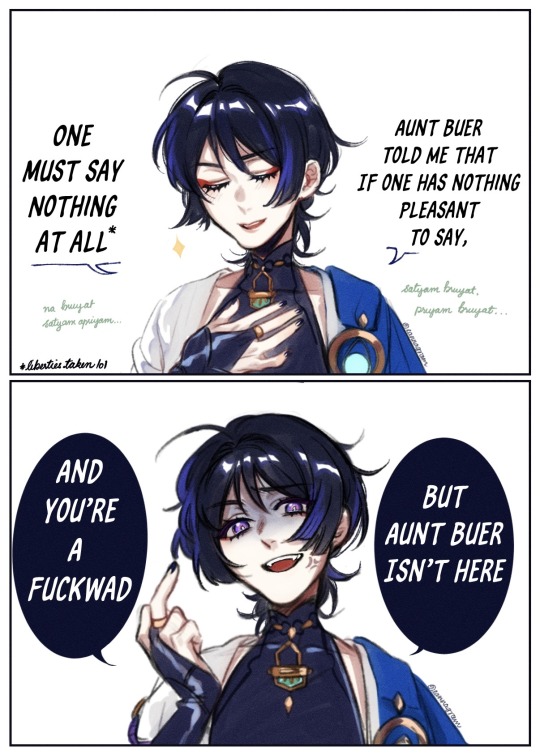
Wanderer’s Advice
16K notes
·
View notes
Text
i think not-shamhat should be banned from drawing enkidu
1 note
·
View note
Text
Epic of Gilgamesh
flood
The Epic of Gilgamesh (/ˈɡɪlɡəmɛʃ/)[1] is an epic poem from ancient Mesopotamia that is often regarded as the earliest surviving great work of literature and the second oldest religious text, after the Pyramid Texts. The literary history of Gilgamesh begins with five Sumerian poems about Bilgamesh (Sumerian for "Gilgamesh"), king of Uruk, dating from the Third Dynasty of Ur (c. 2100 BC). These independent stories were later used as source material for a combined epic in Akkadian. The first surviving version of this combined epic, known as the "Old Babylonian" version dates to the 18th century BC and is titled after its incipit, Shūtur eli sharrī ("Surpassing All Other Kings"). Only a few tablets of it have survived. The later Standard Babylonian version compiled by Sîn-lēqi-unninni dates from the 13th to the 10th centuries BC and bears the incipit Sha naqba īmuru ("He who Saw the Abyss", in modern terms: "He who Sees the Unknown"). Approximately two-thirds of this longer, twelve-tablet version have been recovered. Some of the best copies were discovered in the library ruins of the 7th-century BC Assyrian king Ashurbanipal.
The first half of the story discusses Gilgamesh, king of Uruk, and Enkidu, a wild man created by the gods to stop Gilgamesh from oppressing the people of Uruk. After Enkidu becomes civilized through sexual initiation with a prostitute, he travels to Uruk, where he challenges Gilgamesh to a test of strength. Gilgamesh wins the contest; nonetheless, the two become friends. Together, they make a six-day journey to the legendary Cedar Forest, where they plan to slay the Guardian, Humbaba the Terrible, and cut down the sacred Cedar.[2] The goddess Ishtar sends the Bull of Heaven to punish Gilgamesh for spurning her advances. Gilgamesh and Enkidu kill the Bull of Heaven after which the gods decide to sentence Enkidu to death and kill him.
In the second half of the epic, distress over Enkidu's death causes Gilgamesh to undertake a long and perilous journey to discover the secret of eternal life. He eventually learns that "Life, which you look for, you will never find. For when the gods created man, they let death be his share, and life withheld in their own hands".[3][4] Nevertheless, because of his great building projects, his account of Siduri's advice, and what the immortal man Utnapishtim told him about the Great Flood, Gilgamesh's fame survived well after his death with expanding interest in the Gilgamesh story which has been translated into many languages and is featured in works of popular fiction.
Relationship to the Bible
Panbabylonism
Various themes, plot elements, and characters in the Epic of Gilgamesh have counterparts in the Hebrew Bible—notably, the accounts of the Garden of Eden, the advice from Ecclesiastes, and the Genesis flood narrative.
Garden of Eden
The parallels between the stories of Enkidu/Shamhat and Adam/Eve have been long recognized by scholars.[38][39] In both, a man is created from the soil by a god, and lives in a natural setting amongst the animals. He is introduced to a woman who tempts him. In both stories the man accepts food from the woman, covers his nakedness, and must leave his former realm, unable to return. The presence of a snake that steals a plant of immortality from the hero later in the epic is another point of similarity.
Advice from Ecclesiastes
Several scholars suggest direct borrowing of Siduri's advice by the author of Ecclesiastes.[40]
A rare proverb about the strength of a triple-stranded rope, "a triple-stranded rope is not easily broken", is common to both books.[citation needed]
Noah's flood
Andrew George submits that the Genesis flood narrative matches that in Gilgamesh so closely that "few doubt" that it derives from a Mesopotamian account.[41] What is particularly noticeable is the way the Genesis flood story follows the Gilgamesh flood tale "point by point and in the same order", even when the story permits other alternatives.[42] In a 2001 Torah commentary released on behalf of the Conservative Movement of Judaism, rabbinic scholar Robert Wexler stated: "The most likely assumption we can make is that both Genesis and Gilgamesh drew their material from a common tradition about the flood that existed in Mesopotamia. These stories then diverged in the retelling."[43]Ziusudra, Utnapishtim and Noah are the respective heroes of the Sumerian, Akkadian and biblical flood legends of the ancient Near East.
Additional biblical parallels]
Matthias Henze suggests that Nebuchadnezzar's madness in the biblical Book of Daniel draws on the Epic of Gilgamesh. He claims that the author uses elements from the description of Enkidu to paint a sarcastic and mocking portrait of the king of Babylon.[44]
Many characters in the Epic have mythical biblical parallels, most notably Ninti, the Sumerian goddess of life, was created from Enki's rib to heal him after he had eaten forbidden flowers. It is suggested that this story served as the basis for the story of Eve created from Adam's rib in the Book of Genesis.[45] Esther J. Hamori, in Echoes of Gilgamesh in the Jacob Story, also claims that the myth of Jacob and Esau is paralleled with the wrestling match between Gilgamesh and Enkidu.[46]
Book of Giants
Gilgamesh is mentioned in one version of The Book of Giants which is related to the Book of Enoch. The Book of Giants version found at Qumran mentions the Sumerian hero Gilgamesh and the monster Humbaba with the Watchers and giants.[47]
Influence on Homer
Numerous scholars have drawn attention to various themes, episodes, and verses, indicating that the Epic of Gilgamesh had a substantial influence on both of the epic poems ascribed to Homer. These influences are detailed by Martin Litchfield West in The East Face of Helicon: West Asiatic Elements in Greek Poetry and Myth.[48] According to Tzvi Abusch of Brandeis University, the poem "combines the power and tragedy of the Iliad with the wanderings and marvels of the Odyssey. It is a work of adventure, but is no less a meditation on some fundamental issues of human existence."[49]
In popular culture
Gilgamesh in popular culture
The Epic of Gilgamesh has inspired many works of literature, art, and music, as Theodore Ziolkowski points out in his book Gilgamesh Among Us: Modern Encounters With the Ancient Epic (2011).[50][51] It was only after World War I that the Gilgamesh epic reached a modern audience, and only after World War II that it was featured in a variety of genres.[51]
2 notes
·
View notes
Note
Since @geminavaju shared I figured I may as well add to that conversation.
I've not actually written a lot of smut. The vast majority has actually been through submissions here- and one of the reasons I have submitted a lot here is just literally cuz I need to practice.
Recently I tried to write an adult scene for my big main writing project that I've invested a lot of time into. It was supposed to be a big payoff moment in that story- but the key word is 'tried' here. I kinda just figured writing smut would just be like writing anything else and it'd be easy for me to hop right into with a little bit of extra vocabulary. I got like 3 lines into it before I legitimately asked myself: "What the fuck am I writing this is awful".
So yeah: turns out writing smut is really awkward at first, especially between characters you had not considered sexual beings previously. Who'da thought? Could be I'm just not used it, could be some weird internalized guilt, could be my inability to not project onto fictional beings, but yeah that shit doesn't come easy to me and still doesn't. I assume it's like a muscle thing where you gotta work it to strengthen it, that how most creative ventures seem to be (like I can't write smut or draw anything for shit but I'm much better at writing action sequences because I've written tons of those). So- I'm getting there I think.
What's helped me the most probably is actually to think of it in terms of characters, similar to what Gem said. This is how I think through basically everything else in writing is to just go back to your characters and ask "What the hell would they do here?". To use Godzilla as an example: if I stuck the head honcho lizard into a situation where he really likes someone else and wants to express that physically- how does he do that? What I really like about this approach is that A. It always gives you something no matter who occupies that second spot and B. The answer is entirely dependent on the author. You can slot anyone- literally anyone- into that second spot and the characters will give you something, even if it doesn't end in le sex. Mothra, Rodan, Ghidorah, Kong, fucking Cloud Strife- put anyone in that spot, let the characters guide you, and just see where it goes. Something will happen every time without fail (this reason alone is why i am also a chronic multishipper- the amount of permeations and alternate relationship paths to explore and facets of a single character to write drives my ass forward). Additionally- the answer to the question "What the hell would they do here?" is 1000% author dependent. Going back to Godzilla; you, me, Gemini, basically everyone on this damn website would answer that question at least a little differently because we've all got a different interpretation of the big pink dinosaur in our heads. It's only exacerbated by Godzilla's personality not being super concrete and able to be interpreted many different ways- but it does stay true for other characters as well.
So yeah, return to the root of the story (the characters) and things start going better.
Yeah, it's very much a back-and-forth between character and writer; in my case it's actually gotten challenging to write Shamhat because it involves beings who've been around for millennia and they know a lot about doing the deed, on top of there a large cast of characters; meanwhile when my SIGNALIS series Liebchen, Komm Zu Mir took a smutty turn it was easier to write because not only was it new and different, both characters are comparatively more relatable (one human and one Replika, which are based on humans). Both are canonical lovers who've known each other for almost a decade if not longer, and it was fun to imagine how an android with no reproductive organs or erogenous zones, who is built for combat and engineering and nothing else, can conceivably experience arousal and an orgasm equivalent. (Answer: a bit of phantom limb syndrome and a heat ventilation system inspired by a fan comic of Ariane wondering What Does This Button Do?)
4 notes
·
View notes
Text
Saw some fanservants pop up recently and the goodness of their shit makes me wanna draw out my Shamhat / Tiamat Alter Ego fanservant i made up last year for a fate fic i mever wrote
1 note
·
View note
Text
The Blue & Orange Morality of the White Lion and the Life Givers of Oriande
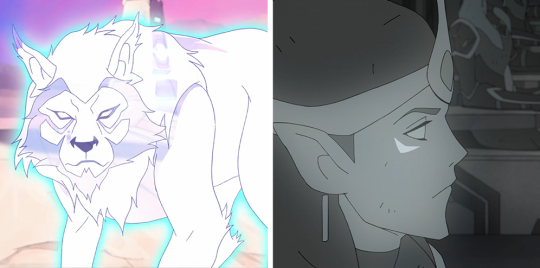
Prompted by an Ask, this very long post examines the White Lion and its condition for obtaining the knowledge of Altean Alchemy.
“Hi! I can't stop thinking about White Lion. Why is the condition for obtaining the knowledge so stupid? Give up your life? If anything, Allura wanted that knowledge for personal reasons (being Altean, father's daughter etc.), while Lotor went there with a purpose—he needed that knowledge so his own “Voltrons” would work with Alteans from Colony. It seems natural to fight, when lives of people depend on your success. And how did Haggar get that knowledge?”
My answer as to these questions—especially the White Lion and its condition for obtaining knowledge—is to deep dive into some meta and analysis by:
Skimming some literary and mythological concepts that relate to the Life Givers of Oriande and the White Lion via the basics of the Quest for Secret & Sacred Knowledge
Comparing VLD and the Prometheus and Alien: Covenant films where this quest appears
Exploring the requirements for entry to Oriande and the price of obtaining Secret & Sacred Knowledge in VLD
And how that applies to Lotor, Allura, Haggar, and Alfor
First, some context: There is a Reason™ why certain tropes, and certain types of plot lines, and certain types of character arcs are bundled together and progress in certain ways. These combinations are Timeless. Generally speaking, they work well so long as one follows the unwritten rules that bind them together. Their predictability can be offset by a skilled and clever writer. These combinations are the building blocks of Ur Stories, and many Ur Stories (and their contemporaries) involve Quests for Secret & Sacred Knowledge.
The White Lion’s strange condition for obtaining knowledge is one found in many such stories, told in myriad ways, and is one of the oldest concepts in human story-telling, hence why it almost always appears bundled with certain tropes, plot lines, character arcs, etc.
From Odin’s unyielding quest for knowledge and willingness to pay any price for it, to Prometheus’ defiance of the Gods to give mortals the Gift of Fire, to Victor Frankenstein’s ‘dangerous pursuit of knowledge’ resulting in the tragic creation of a monster, to Enkidu’s tryst with Shamhat leaving his physical prowess diminished but his mind expanded, and throughout many more such stories; the following theme emerges: When knowledge is gained, something is lost.
The loss can be intentional (e.g. sacrifice) or unintentional (e.g. consequences).
In many stories with a similar setup, the White Lion and the Life Givers of Oriande would be a case of Blue & Orange Morality (this is not the same as being “morally gray”). In these kinds of stories, the Keepers of Knowledge often judge worthiness in a completely different way from that of the Knowledge Seeker, and they may even be pulling the strings for their own purposes that are incomprehensible to those who seek their knowledge. Their requirements for the gift of knowledge fulfills their own morality, and one to which they adhere, but that morality has little resemblance to what a Seeker of Knowledge may believe in…unless that Seeker learned their ways and began to practice them.
The Secret & Sacred Knowledge is for the taking by whomever is willing to pay the price, meaning that even the most vile and evil being that ever lived could gain the Knowledge for their own use. Thus the Keepers of Knowledge are not bound by a morality that would require them to prevent access by the evil and wicked. The only time the Keepers will care (e.g. divine retribution of some kind) is when the rules for gaining or using that knowledge are broken or some line is crossed by a prideful mortal. While there are stories where the morality of Keepers of Knowledge align with a general black-and-white morality of good and evil, Oriande and associated Altean-related concepts (not to mention, the Voltron lions) do not consistently give off the usual and unambiguous signals of black-and-white (e.g. good vs evil) morality.
Part I: Breaking the Keeper's Rules (two examples).
The titan Prometheus’ punishment for defying the Keepers (e.g. Zeus and the gods) is to be bound to a rock for an eternity as an eagle eats his constantly regenerating liver each day; and
Victor Frankenstein has no deity to punish him for his God-defying scientific experiments, but tragedy finds him anyway.
In both of these examples, the knowledge gained came with a heavy and tragic price.
In example of Prometheus, (there are several versions) he is moved by the plight of mortals, their hard lives could be made better with the Gift of Fire (e.g. Knowledge), a gift that is jealously guarded by Zeus and the gods on Mt. Olympus. In some versions, the mortals already had the Gift of Fire, but Zeus took it from them out of anger of a trick played by Prometheus which benefitted the mortals in the form of sacrificial offerings. Either way, Zeus and the gods have a Blue & Orange morality. Prometheus’ intentions were noble and good, but his means via trickery broke the arbitrary rules of the gods (e.g. the Keepers of Knowledge). Why would the gods withhold this gift if it could do good? Because in the wrong hands, Fire can be weaponized and used for destruction. Remember that because we’ll return to this as VLD gives us a subtle Promethean character arc.
In the example of Victor Frankenstein—from Mary Shelley’s “Frankenstein; or The Modern Prometheus”—he takes his obsessive pursuit of knowledge, the secrets of life and death, too far in the name of science. He realizes too late the horror that he has created, and abandons his creation (the monster that is erroneously called Frankenstein outside of the story). Frankenstein's monster gradually destroys his life by murdering friends and family, even framing him for it. Shelley’s use of “The Modern Prometheus” as the subtitle of her novel intentionally invokes the myth of Prometheus and the divine retribution he suffered for his transgression against the Keepers of Knowledge. The punishment delivered to Frankenstein is a strange kind of black-and-white morality, as it is the price paid for transgressing Natural Law through science. One could call it “natural retribution” in absence of the divine. Here, the Keeper of Knowledge is simply Nature itself.
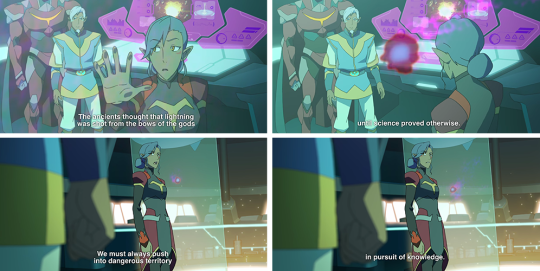
Above, Honvera rebukes Alfor’s caution: “The ancients thought that lightning was shot from the bows of the gods until science proved otherwise. We must always push into dangerous territory in pursuit of knowledge.”
In VLD, Honerva’s Frankenstein-like obsession with quintessence, and her willingness to push further—to break natural boundaries in pursuit of knowledge—is her undoing. Honerva’s tragedy does not stop with herself and her family, as the price of knowledge gained is paid for by the entire universe for 10,000 years.
Part II: The Quest for Secret & Sacred Knowledge In Space.
In Season 5 of VLD, the basic template of a Quest for Secret & Sacred Knowledge appears in the form of the journey to Oriande. The same basic quest template also appears in the Prometheus and Alien: Covenant films.
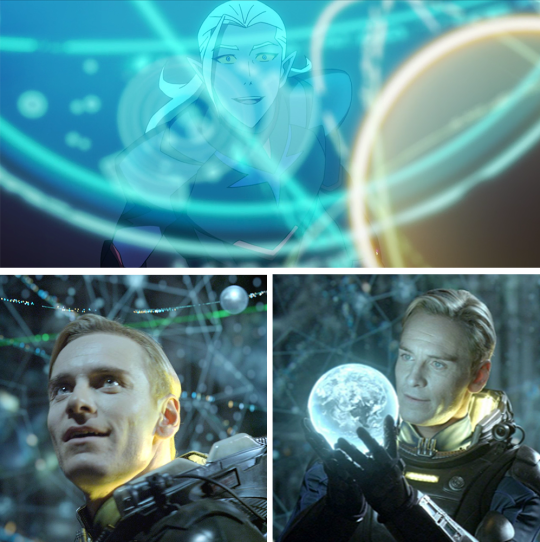
Above, a summary: A pretty, well-spoken, ageless, pale-haired man with a British accent is used-and-emotionally-neglected by his powerful father whom he grows to despise and is treated badly and distrusted by his father’s kind. The father is prideful and has a bit of god complex. After his father’s well-deserved death, the man embarks upon a Quest of Secret & Sacred Knowledge held in a far-off utopia guarded and/or inhabited by Ancient Keepers of Knowledge. His companion to this utopia is his love interest, a petite and well-spoken woman with a British accent who is stronger than she looks, and is instrumental to finding the star map that initiates the quest to begin with. The sought-after secret knowledge has themes of life and creation. These secrets are yielded through life sacrifice and prove to be dangerous in the wrong hands.
I’m not saying that VLD ripped off Prometheus and Alien: Covenant but here we are...
The starting premise of Prometheus is that an exploration mission to planet LV-223 is organized by Peter Weyland, an old and dying CEO who bankrupts his corporation to pay for this mission. He is desperate to find humanity’s creators—called “Engineers” by Elizabeth Shaw and Charlie Holloway—firm in the belief that they will grant him immortality. The location of LV-223 is revealed through the discoveries of star maps in the form of cave drawings by Shaw and Holloway.

Above: Upon arrival to LV-223, the crew discovers a temple and within it are urns containing a mysterious black goo, as well as long dead remains of some Engineers. They quickly discover that this black goo has strange and unexpected properties. It doesn’t go well for them, after all, this is the prequel to the Alien franchise.
youtube
Above, content warning: None. The video clip above shows the discovery of the mysterious urns within the Engineer temple.
So we’ve got cave drawings that function as a star map, a temple constructed by ancient creators keeping the secrets of life, and a mysterious substance that can create powerful monsters via its transmutational properties.
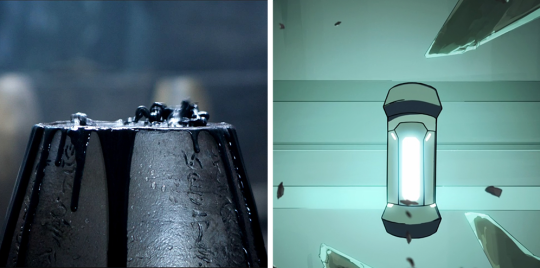
Above: in addition to being an unobtanium power source, some forms of quintessence can have transmutational properties as with the black goo in Prometheus.
Below: a xenomorph derived from a chain of gradual evolutions that began with the black goo and an unlucky victim, and Ranveig’s super weapon, the horror- monster-esque result of experiments with the strange quintessence.

In both Prometheus and Alien: Covenant, this black goo—called “Chemical A0-3959X.91 – 15”—is a weaponized mutagenic pathogen that delivers a modern sci-fi twist on transmutational alchemy and transformation potions. Chemical A0-3959X.91 – 15 evolves non-botanical life, by first destroying it, and then creating something new out of that which it comes into contact.
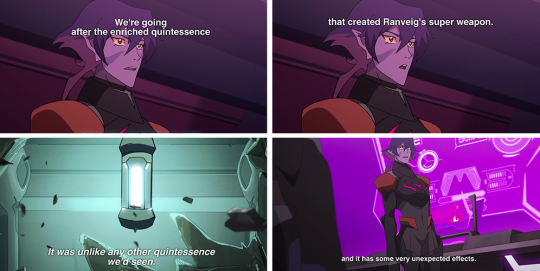
Above: Krolia tells Keith about the quintessence that the BoM have been tracking (two separate scenes). “We’re going after the enriched quintessence that created Ranveig’s super weapon. [...] It was unlike any other quintessence we’d seen. [...] and it has some very unexpected effects.”
How strangely familiar all of this is! Let’s continue.
The Engineers, creators of human life, and their morality:
Throughout Prometheus, the Engineers—the Ancient Keepers of Knowledge—are revealed to embody a Blue & Orange Morality and are the creators of human life (among others) and they sometimes return to judge their creations.

Above: An Engineer asks, “Why does he [Weyland] want more life? What makes this man so great as to ask such a thing?”
youtube
Above, content warning: Video clip of extended/deleted scene where David 8 speaks with an Engineer and Weyland asks for immortality. There is a quick decapitation (bloodless because David 8 is a Synthetic) and some quick impact deaths. No gore. Use the YouTube gear/settings icon to turn on subtitles to see what the Engineer is saying.
Addition/Edit: The video clip above doesn’t link anymore and Tumblr wont’ let me add another video, so here’s the URL until I can re-edit this properly to fix it.
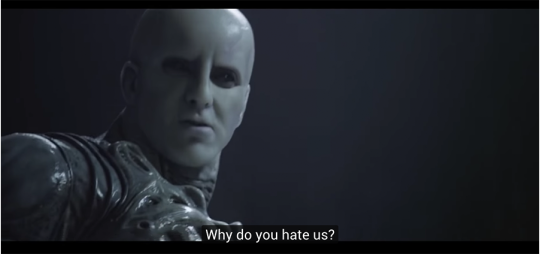
Above: the Engineer directs his cold stare at Elizabeth Shaw who wants answers as to why they were lured to LV-223 to find the weaponized pathogen. She asks “Why do you hate us?”
The Engineers created humanity and have a detached will to wipe the slate clean and start all over again, sacrificing their own lives in the act of new creation. Within their their beliefs and morality, creation and destruction are intertwined. It is death that begets life. What Elizabeth Shaw sees as hate, is just the Engineers’ way of perfecting their own flawed creations. Nothing personal.
The morality of the Engineers later corrupts David 8 (who was already morally gray) during his years of studying them, as he learns their ways during The Crossing, which takes place between Prometheus and Alien: Covenant.
Below: David 8 and Elizabeth Shaw operate the navigation system of the Engineer’s ship in The Crossing.
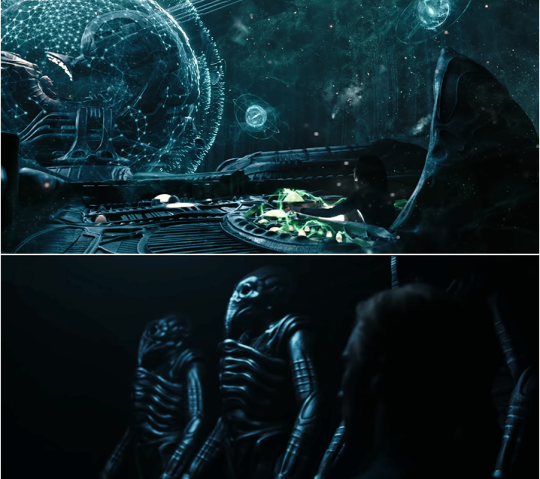
Above: after Shaw is put to sleep in a cryobed, David 8 is left alone to study the Engineers for the remainder of their journey. When they arrive, he has learned their ways and has come to a grim decision of what to do with their weaponized mutagenic pathogen.
youtube
Above content warning: None. This promo video ends just before David 8 unleashes the Engineers’ own weapon against them upon his arrival to their utopia.
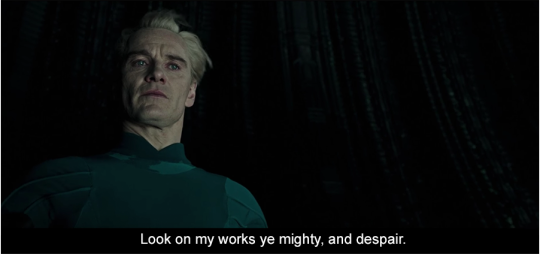
Above: If y’all thought Lotor was dramatic... David 8 overlooks the destruction and cries while reciting a line from Ozymandias. “Look on my works ye mighty, and despair.”
Below, content warning: Video clip with body horror and abstract gore, slightly obscured by dim lighting and desaturated colors during David 8’s destruction of the Engineers.
youtube
As these video clips and images show, the ways of the Engineers—their philosophy and morality—lead David 8 into crossing the Moral Event Horizon. He becomes both a God-Slayer (destruction of the Engineers) and a Creator of Life (cultivation and creation of the Xenomorphs).
About mid-way through Alien: Covenant, David 8 is revealed to have betrayed the person he loved, Elizabeth Shaw, by using her for organ harvesting. The harvesting was necessary for the creation and cultivated evolution of the perfect life-form: the Xenomorph (I’ll spare y’all the images of that).
Through his mastery of the Engineers' knowledge, David 8 becomes the Greater Scope Villain of the Alien franchise. His story is one of triumph. He wins against those who wronged him, against the father that used him and considered him soul-less (thus less than a human), against the humans that created him to be used, and against the Engineers that created a humanity that he sees as unworthy of the gift of creation in the first place. A gift denied to David 8 because he is a Synthetic. All it cost David 8 to gain this gift of knowledge was the sacrifice of the only person who was kind to him (and possibly loved him, that's unclear).
The loss-and-sacrifice of Shaw fulfills the Sacred Knowledge Quest rule that: when knowledge is gained, something is lost.

Above: an Engineer uses the black goo to transmute his own body in order to seed non-botanical life on Earth.
The off-screen sacrifice of Shaw’s life echoes the beginnings of human life shown in the opening of Prometheus where an Engineer seeds life on Earth by sacrificing himself via the pseudo-alchemical transmutation of his own body.
youtube
Above content warning: Abstractly graphic. Not bloody, but the Engineer’s body is slowly disintegrated while being transmuted by the black goo. No gore.
An eerily similar Quest for Sacred & Secret Knowledge mixed with horror appears in VLD, spread out between Lotor’s actions prior to the start of the series, the journey to Oriande in Season 5, and the events in Season 6.
The Life Givers and Altean Alchemy:

In VLD, the Keepers of the Secret & Sacred Knowledge of Altean Alchemy are called the “Life Givers” by Lotor, and the “Sages” by Allura. As shown in the image above, they are described by Lotor as “the first Alteans to unlock the secrets of Oriande, the beginning of Altean Alchemy.”
One of them—presumably a Life Giver—is later shown without corporeal form when speaking with Allura after she passes the White Lion’s trial. Allura is told that she is in the realm of her ancestors—the Alteans and Life Givers—implying that she is one of them for she is “home”.
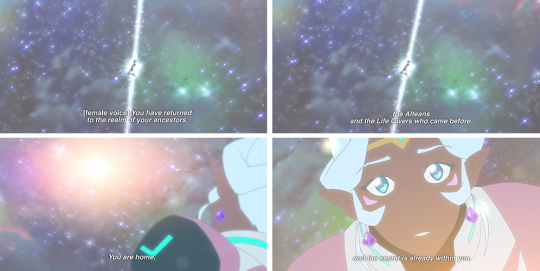
Above: the cosmic voice tells Allura “You have returned to the realm of your ancestors, the Alteans and the Life Givers who came before. [...] You are home, and the secret is already within you.”
For those keeping score: Life Givers = Engineers.
The morality of the Life Givers is unclear as story events—and the aforementioned bundle of Timeless tropes and concepts—suggest Blue & Orange morality, while the implied traits and other in-story associations thus far (ahead of S8) with the Alteans and Alfor suggest that the Life Givers of Oriande embody a morality of Perfectly Good Pureness in opposition to the Galra’s presumed Horribly Evil Darkness. It’s upon examining the actions and beliefs of the Alteans—and thus the Life Givers—that a superficial black-and-white morality starts to give way to a Blue & Orange morality that is incomprehensible in various ways (e.g. the White Lion’s strange condition for obtaining knowledge).
Like David 8, Lotor learns of the Life Givers’ ways prior to arrival at the utopia, only in his case, he does so without realizing it and his understanding is warped by being raised in the Galran belief system. Here, their ways—to give of one’s life, and/or that life must be sacrificed to obtain knowledge—are associated with the Alteans and Lotor's study of Alfor’s work, Altean culture, artifacts, and ancient drawings (until the story unambiguously shows otherwise). Unlike David 8, Lotor’s sacrifice and quintessence harvesting of those who loved-and-worshipped him occurs before entering the utopia (if the events described by Romelle are true). Also, unlike David 8, Lotor’s story is not one of triumph against those who wronged him and others, but like David 8, Lotor was on the path to attaining something greater than his nature would have otherwise allowed.

Above: David 8 delights in the unexpected unlocking of the Engineer’s star map, and both Lotor and Allura are shown the same way when Allura unlocks the star map to Oriande from the compass stone.
In both Prometheus and VLD, the clues to the location of the utopia comes from a combination of ancient cave drawings and navigation devices left behind. These clues form star maps and the like, but are mostly unusable until they are unlocked, by David 8 in Prometheus, and Allura in VLD. As shown above, their respective unlocking and reveals are very similar.
The big difference here is that in Prometheus, there are two star maps: (1) the initial star map—derived from cave drawing to reveal the location of planet LV-223—is discovered and deciphered by Elizabeth Shaw and Charlie Holloway; and (2) the star map in the navigation room that reveals the location of the Engineer’s home world (a utopia called ‘paradise’ in their language). Thus, in Prometheus, the Quest for Secret & Sacred Knowledge is divided into two parts, with the second part to be completed prior to Alien: Covenant in The Crossing.

Above: that’s one hell of a mouth on these monsters (Hammerpede and Deacon from Prometheus, and Ranveig’s super weapon from VLD).
Given how closely Oriande and Lotor’s role in that part of VLD’s story parallels David 8’s in Prometheus, I would not be surprised if Ranveig’s Super Weapon was informed by Xenomorphs, especially since the transmutational properties of the black goo would find a correlation in the strange effects of the quintessence found by Ranveig.

Above: Allura passes the White Lion’s trial by being non-violent and speaking to its philosopy. “I seek the secret of life. I give my own.”
For Allura’s part, unlike Shaw, she survives the Quest for Secret & Sacred Knowledge. Her willingness to self-sacrifice during the White Lion's trial, for the sake of knowledge, relates to Shaw’s unwilling sacrifice in Prometheus. Both sacrifices lead to knowledge. Allura for her own gain (in addition to Lotor’s), and Shaw for David’s gain.
The key here is that both stories demand a sacrifice of life for knowledge, and the knowledge obtained has to do with the power of creation and life with alchemical themes (transmutational).
That’s heavy stuff. It’s mythic level. These are themes found throughout humanity’s oldest stories, myths, and religions. It’s the stuff of Warring Gods, Capricious Fair Folk, Geas and Mystic Debts, and Divine Retribution, and Tragic Fates.
Which brings us back to Anon’s question about the White Lion:
“Why is the condition for obtaining the knowledge so stupid? Give up your life?”
Superficially, the White Lion is just another DotU reference. There’s nothing deep or meaningful about it on its own.
Thematically, the White Lion’s Trial is similar to the Blade of Marmora’s Trial. The BoM’s creed “Knowledge or Death” is informed by the Galra creed “Victory or Death”, both of which are contrasted by Allura’s words to the White Lion: “I give my own [life].”
It’s most likely that’s all there really is to the White Lion and Oriande, and thus there is nothing else here to dig at as far as the story is concerned. “Give up your life” for knowledge is merely a part of the aforementioned package of Timeless tropes and concepts that are frequently found in Quests for Secret & Sacred Knowledge and other Ur Stories.
But for the sake of meta, I’ll pretend that there is more to the White Lion and the Life Givers of Oriande.
To recap: within the context of Ur Stories, the White Lion and the Life Givers of Oriande are Keepers of Knowledge. The White Lion is the kind bound by some form of morality that dictates who gets access and how it tests those who seek it, while the Life Givers bestow it. Prometheus and Alien: Covenant are a recent example of this kind of story, and a similar tale plays out in VLD.
Part III: The Case for Blue & Orange Morality.
From the start, the White Lion’s requirements have their bias in Altean-ness, but not just any Altean-ness. A “worthy” Altean. Given that Alfor, Lotor, Allura, and Haggar were all worthy to enter Oriande, their past actions or goals/desires were less important, or not even a consideration. Thus, worthy Altean-ness is arbitrary from the outside, but must suit the Blue & Orange morality of the White Lion in some way. Additionally, only the worthy can pilot the lions of Voltron (depending upon where we are in the series and when the requirement lore is discussed or retconned), and yet none of them could enter Oriande. Why is that? What made Lotor—a half-Altean who Did Bad Things™—more worthy than Lance who was chosen to be the paladin of two different Lions? This arbitrary worthiness contradicts the symbolism of the Guardian being a “White Lion” that ties it to Voltron (and possibly the Lion Goddess worship of the Arusians). Such contradictions are reasonable to expect out of Blue & Orange morality.
However, if the White Lion and Oriande were meant to embody the Perfectly Good Pureness of the Alteans, then that raises a lot of questions about why Lotor and Haggar were able to enter while the paladins were not. While Haggar is shown to be using her magic, and possibly over-powering the White Lion and the Life Givers, I’ll explain why that might not be the case. Alternatively, this contradiction reveals a huge plot hole.
In the case of Blue & Orange morality, anyone being allowed to enter is questionable, as typically, Powerful Eternal Entities Protecting Sacred Knowledge who adhere to Blue & Orange morality often have their own motivations, plans, goals, etc that involve the use of the Knowledge Seeker in some way. In other words, the White Lion and the Life Givers may have their own agenda, and any who enter Oriande are at risk of being used to further it (either knowingly, unknowingly, cooperatively, or uncooperatively).
Oriande calls back to those Ur Stories, because one doesn't set up Blue & Orange morality behind a Quest for Secret & Sacred Knowledge in a setting like VLD without a plot twist revealing Something to embody that morality as an obstacle to the protagonists at the 11th Hour (if consistency in world-building and adherence to genre conventions were to apply). Thus, we are looking at Playthings of the Gods, or a Greater Scope Villain scenario that has something to do with Oriande. This also means that at least one of these four: Alfor, Lotor, Allura, and Haggar, were lured to Oriande for the purpose of Something Else.

Above: Haggar emerges from the temple, sparkling with divine purpose, and is restored as Honerva.
Haggar’s restoration into Honerva all but seals Blue & Orange morality for me. She got a huge pay-off from Oriande, and from the protagonist-centered morality PoV, she was the least worthy to enter, and so far appears to have paid no price. Additionally, in some stories with Blue & Orange morality, Haggar’s 10k years of reaping quintessence from the destruction of planets (and every living thing) would be seen as a necessary process to maintain the balance of creation. As in Prometheus, Death begets Life.
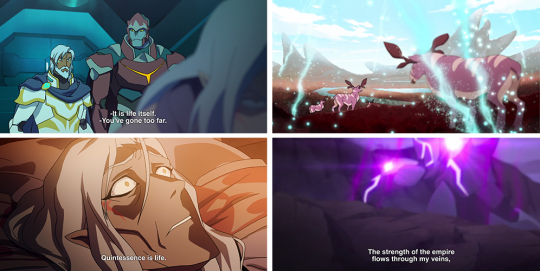
Above: Honerva equates quintessence with life twice in The Legend Begins. The Komar is used to reap quintessence from a planet in Taking Flight. And when Zarkon powers himself up during his fight with Lotor in Blood Duel, he does so with the quintessence that has been collected for the use of the Empire.
Thus, when Zarkon says “the strength of the Empire flows through my veins” he means that literally and symbolically. He is made stronger through all of the life energy reaped within his empire, every living thing which has died is within him. Through Honerva’s work, Death begets Life (a cursed life perhaps, but life all the same).
Why Perfectly Good Pureness doesn’t work:
If the White Lion and Oriande were meant to embody Perfectly Good Pureness, then that makes the entrance of Haggar and Lotor highly questionable.
Either that’s flawed writing, or there is something else is going on that’s not adding up:
Lotor is revealed to have harvested quintessence from Alteans (which may not be the full story), and Altean-ness is a pre-requisite to enter Oriande, and Allura is Altean while Lotor is half-Altean. But Allura is also implied to be a Life Giver and that Oriande is her home, meaning that the Life Givers and Altean-ness are closely-related. If what Romelle said about Lotor was true, by any stretch of Perfectly Good Pureness morality, the White Lion should not have given Lotor the all-clear signal in the form of Marks of the Chosen due to Lotor's past sin of evil acts against Alteans. So either his past with the Alteans at the Colony do not qualify as evil (which contradicts Perfectly Good Pureness), or those actions didn’t happen in the way that Romelle described them.
If Lotor wouldn’t have been worthy to enter Oriande due to his past actions, then that could mean that he was allowed to enter for the sake of having brought Allura there, his failure of the White Lion’s Trial foreseen and thus no risk of him gaining the sacred knowledge. This means that he was used by the Life Givers to serve their purpose.
Further, being half-Altean wasn’t a barrier to Lotor, which means that he must have something else in common with Allura to qualify in this scenario which brings us to...
If Life Givers and Altean-ness are closely related, and if Allura is both a Life Giver and an Altean, then either all Alteans are Life Givers, or only some are, as implied by Lotor in the temple. That it was those first Altean alchemists who to came to Oriande and they are the Life Givers. But the Life Giver that Allura speaks to says that the secret is already inside of her. Why would she even need to go there? Was that true of the first Altean alchemists as well? This smells a lot like Allura is host to a cosmic entity and those stories don’t usually end well for the host (e.g. Dark Phoenix from the X-Men). In which case, the Perfectly Good Pureness morality doesn’t work, as why are the Life Givers using Alteans as hosts? And if they use Alteans as hosts…do they discriminate against half-Alteans? And why do they hide their knowledge behind an arbitrary test?
Haggar should not have been able to get anywhere near Oriande for obvious reasons.
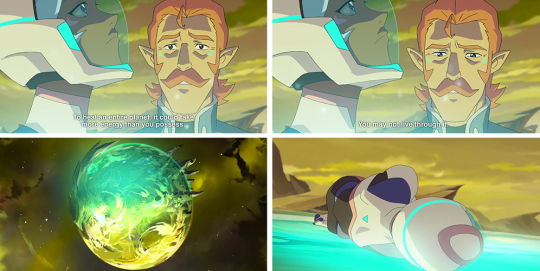
Above: Allura embodies the Life Givers’ philosophy when she risks herself to heal the dying Balmera in Rebirth. Coran says “To heal an entire planet, it could take more energy than you possess. You may not live through it.”
Even before entering Oriande, Allura had enough quintessence—life energy—to heal a dying Balmera. Do all Life Givers have that much quintessence within them? Does this mean that the Life Givers were on par with Allura prior to her entry to Oriande? If so, what power is Oriande giving them that they didn’t already possess? Within the context of Quests for Secret & Sacred Knowledge, it appears that the secret knowledge is about how to use that power to its fullest extent. Surely that comes with a price?
Anon also asks: “How did Haggar get that knowledge?”
Haggar gets the knowledge in the same way that Allura did, by being worthy to enter, and, either by knowing the philosophy behind the White Lion’s trial or by over-powering the White Lion and the Life Givers. The former can appear to be a stretch, but the latter doesn’t make a lot of sense.

Above: Haggar at Oriande, her own Marks of the Chosen, and the difference between her encounter with the Sage Statues and Allura and Lotor’s encounter.
In Season 6, Haggar arrives at Oriande’s location, her Marks of the Chosen appear, thus she gets the ‘all clear’ signal from the White Lion. Haggar is worthy of Oriande. She then enters the temple where we see her doing one of her casting circles as the Sage Statues (e.g. the Life Givers in statue form) are poised to attack.
In the case where the White Lion and Oriande embody Perfectly Good Pureness, it would be necessary for Haggar to over-power them in order to enter as she could not be considered worthy unless Blue & Orange morality applied. At the very least, Haggar was deemed worthy by the White Lion’s arbitrary requirements. So did Haggar over-power the Sage Statues, or did she offer them a gift as Allura did?

Above: Haggar and her druids transferring quintessence to Zarkon, and Allura and the Balmerans transfer quintessence to heal the Balmera.
We’ve seen Haggar and her druids use similar orientations and positions as Allura and the Balmerans do when channeling their quintessence into another being such as Zarkon, or in the case of Naxella, a planet. When they attack with quintessence, and when they reap quintessence via the Komar, their positions are different. This channeling position is used by Haggar in Oriande when she meets the Sage Statues (again, the Life Givers in statue form).
So either Haggar gave them a gift, or she over-powered them. But if Haggar can overpower the Life Givers…then why does she need the secrets of Oriande?
To put it another way, if Haggar can over-power beings capable of (at a bare minimum) restoring a Balmera as Allura did, but after they have ascended to be part of Oriande (so even more powerful right?) then what Secret & Sacred Knowledge could the Life Givers of Oriande possibly bestow upon her that would make any of that effort and risk worth it? Is there something else in Oriande that she may have been after instead?
What secrets are so powerful, that Haggar—who by this line of logic may as well be all-powerful herself—needs them to fulfill her goals?
These same secrets are also now known to Allura, though the argument can be made that Haggar-now-Honerva had much more time to study them properly. These secrets have unlocked Allura’s potential, giving her—as Lotor says during their battle in S6—“all the power in the universe”. Hypothetically, Honerva has unlocked this power within herself as well.
And this is why we've got a case of Blue and Orange morality. For so long as one fulfills some arbitrary requirements, then one is allowed in. The next parts, getting past the Life Givers in the form of the Sage Statues, and passing the White Lion’s Trial relate back to the Blade of Marmora. For the BoM, one has to be thinking like them to pass (Knowledge or Death). For the White Lion and the Life Givers, one has to understand the philosophy underlying their Blue & Orange morality, which in this case, is giving up life for knowledge. Piece of cake for Allura, quite likely easy for Haggar too, not so for Lotor. Understanding their philosophy is alignment agnostic, both the good and the evil can know it and put it to use.
In Lotor’s case, he failed the White Lion’s alignment-agnostic philosophy exam. Even though he learned their ways enough to replicate some of Alfor and Honerva's accomplishments, and got as far as he did, (and I’d argue to understand the bigger picture of what is necessary to bring peace to the universe). He failed because the Galra philosophy of “Victory or Death” came out in him as the White Lion’s threat triggered that philosophy in addition to his desperation to achieve his goal (which in S6E1 we see hints of his anxiousness towards not being delayed further from). He did not fail due to moral alignment.
From Lotor's PoV—as stated by Anon—“It seems natural to fight, when lives of people depend on your success.” This natural way can easily fall under the Galra’s “Victory or Death”, and leads Lotor to fail, therefore it must be at odds with the morality and/or philosophy of the White Lion and the Life Givers. If not, then it at the very least, it must be at odds with how the Life Givers intend for Altean Alchemy to be used, just as Prometheus’ use of the Gift of Fire went against how Zeus and the gods intended for it to be used.
Thus, Lotor is a Promethean character, setting him against Life Givers' and the White Lion’s morality as he wants to take their Gift (e.g. Altean Alchemy via Allura) for another use, as Anon said: “He needed that knowledge so his own “Voltrons" would work with Alteans from Colony.”
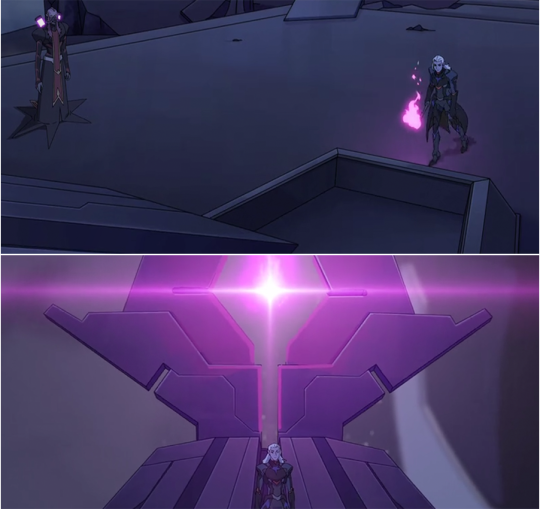
Above: Lotor lights the flame at Kral Zera and double-dipping into flame symbolism.
That other use, what amounts to Altean Alchemy For All, is one that the White Lion’s trial exists to prevent by way of only allowing worthy Alteans to enter. Those worthy Alteans are ‘sacred’, and it is not much of a stretch to assume that they may have once derived their social status from being the only Alteans who can wield this secret power.
While I’m not completely sold on “Voltrons with Alteans” being Lotor's reasoning (definitely for Honerva though), that still aligns with his Dark Savior obsession underlying his desire for power to defend the Alteans himself, or, to enable the Alteans to defend themselves (remember his words to the Puigian leader about how Voltron left the Puigians defenseless). However, Lotor's stated goal—giving unlimited quintessence to the universe for the sake of peace—is analogous to Prometheus taking Fire from Olympus so that the mortals could use its heat and improve their lot. Further, like Prometheus, Lotor is divinely punished for his actions, for via Allura, Lotor stole the means to unlimited quintessence for all (e.g. the Fire) from Oriande and the Life Givers (e.g. Olympus and the Gods).
Divine Punishment:
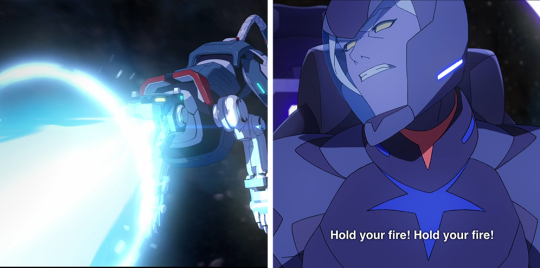
Above: Allura attacks first while Lotor pleads with her. Lotor responds by ordering his generals to hold their fire.
Lotor's divine punishment comes from Allura. Allura takes up a “fight first” instinct multiple times throughout the story, the same instinct that caused Lotor to fail the White Lion’s trial. Allura fights first even though she is from a race that we’re told are excellent diplomats, whose culture and mythological beings (e.g. White Lion and the Life Givers) appear to embody a “giving one’s life rather than fighting” philosophy. This philosophy is what motivated Allura to restore the Balmera at risk of her own life, but her fight first moments throughout the story contradict that philosophy, as well as her readiness to fight rather than embrace a diplomacy-first approach in the case of Ulaz and Kolivan. Allura embraces diplomacy-first when it is easy and convenient.
Two of these fight first times—yeeting Lotor when he was no threat, and attacking Lotor when he was pleading with her—occur after she gained the knowledge of Altean Alchemy from Oriande. I’m not saying that Allura was’t emotionally justified, but part of being the Special Sacred One, is that one is usually required to control those impulses in exchange for the sacred power and knowledge.
In stories where there is a “Here’s this Mythic Sacred Thing you got because of a Quest to a Special Place” event, there are usually conditions upon the continued use of the Thing. Acting against the precepts or philosophy or morality embodied by the Bestowers of the Thing is a Big Deal. It is such a Big Deal, that this conflict appears in stories from nearly every mythology or religion, even if only in the form of the smallest side-story of a minor hero or prophet (e.g. Enkidu from Gilgamesh, or “Don’t look back” for Orpheus and Eurydice).
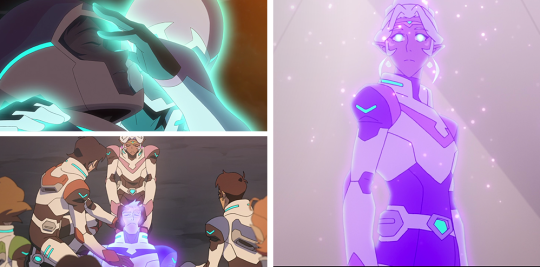
Above: Allura’s power over life on display.
Allura’s got this awesome power now, and it didn’t cost her anything.
That breaks the Quest for Secret & Sacred Knowledge story code (risking her life to not defend against the White Lion barely counts). Allura can bring Lance back to life, shift Shiro’s soul into the body of another person a clone, and myriad other all-powerful plot-friendly things. Yet there is no geas placed upon her? No requirement that she continue to embody the philosophy that allowed her to pass the White Lion’s trial in the first place?
It appears as though Allura's awesome power is inconsistent for when it’s available (cough Plot cough), as in Season 7, she’s a quintessence power house during the fight with Macidus, but she couldn’t save Sanda as she did with Lance?
In the context of Ur Stories, when a Seeker of Knowledge has gained a gift of knowledge and not immediately paid a price—such as when Odin gives an eye for a drink from Urd’s Well of Knowledge—then that Seeker usually has to continue to embody what made them worthy to get the gift in the first place. Or, they must complete some kind of Task or observe a taboo, otherwise they risk the wrath of those who bestowed the gift or lose access to the gift. As Allura does not yet appear to have lost her power, then she may have a Task to complete instead. Violating the seemingly pacifist philosophy of the Life Givers to deliver divine punishment to Lotor may have been permissible given the circumstances.
Finally—Part IV: Payment is Coming Due
While I still doubt that there is anything more to the White Lion than a nod to DotU combined with a basic Quest for Secret & Sacred Knowledge (thus explaining the White Lion’s strange condition for such knowledge), it’s still possible that this is leading to something mythic inline with Ur Stories, especially given VLD’s hellscape setting, dark tone, and love of tragedy. Season 8 could bring us a Playthings of the Gods scenario pitting Allura versus Honerva for reasons beyond the obvious (e.g. a plot twist), or, a tragic fate awaits Allura due to something as classic as Alfor flaking on a Task or Debt asked of him for the knowledge he gained at Oriande (another plot twist).
In many stories where a similar arc or backstory occurred, Alfor should have come back with a Task or a Debt to be called upon at some later date (often tragic and inconvenient). That Task could have been the creation of Voltron, that Debt could have been Allura’s life.
Remember the “I give my life” philosophy?
Time to pay up.
Alfor may have hidden Voltron and Allura from Zarkon, if doing so meant that they would avoid a Tragic Fate for which they were intended by the Life Givers, in exchange for bestowing the secrets of Altean Alchemy upon him. His actions then—in classic Greek tragedy fashion—made the situation immeasurably worse, and the universe paid the price.
Tragic endings are what happens when you back out on a Mystic Deal, or when you try to avoid Fate.
176 notes
·
View notes